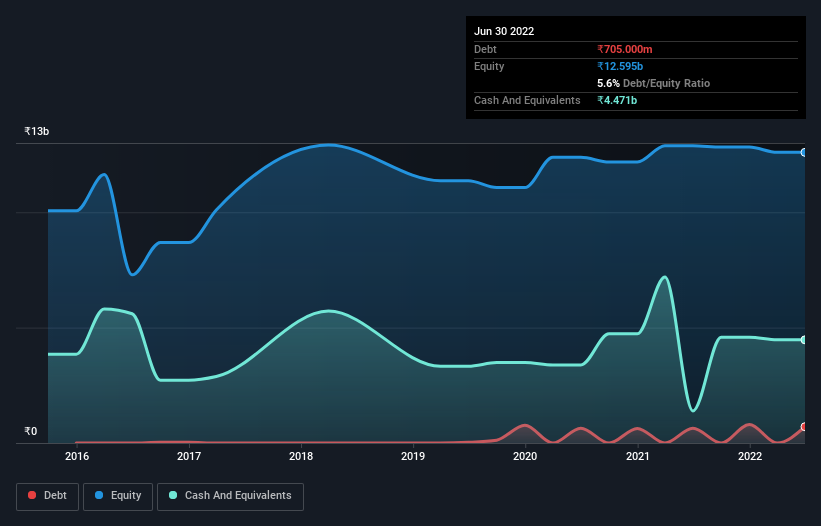Is Akzo Nobel India (NSE:AKZOINDIA) Using Too Much Debt?

Howard Marks put it nicely when he said that, rather than worrying about share price volatility, 'The possibility of permanent loss is the risk I worry about... and every practical investor I know worries about.' So it might be obvious that you need to consider debt, when you think about how risky any given stock is, because too much debt can sink a company. As with many other companies Akzo Nobel India Limited (NSE:AKZOINDIA) makes use of debt. But the more important question is: how much risk is that debt creating?
When Is Debt A Problem?
Debt is a tool to help businesses grow, but if a business is incapable of paying off its lenders, then it exists at their mercy. If things get really bad, the lenders can take control of the business. However, a more frequent (but still costly) occurrence is where a company must issue shares at bargain-basement prices, permanently diluting shareholders, just to shore up its balance sheet. Of course, plenty of companies use debt to fund growth, without any negative consequences. When we examine debt levels, we first consider both cash and debt levels, together.
Check out our latest analysis for Akzo Nobel India
What Is Akzo Nobel India's Debt?
You can click the graphic below for the historical numbers, but it shows that as of March 2022 Akzo Nobel India had ₹705.0m of debt, an increase on ₹639.0m, over one year. But on the other hand it also has ₹4.47b in cash, leading to a ₹3.77b net cash position.

How Strong Is Akzo Nobel India's Balance Sheet?
The latest balance sheet data shows that Akzo Nobel India had liabilities of ₹11.8b due within a year, and liabilities of ₹1.48b falling due after that. Offsetting this, it had ₹4.47b in cash and ₹5.49b in receivables that were due within 12 months. So its liabilities outweigh the sum of its cash and (near-term) receivables by ₹3.36b.
Of course, Akzo Nobel India has a market capitalization of ₹95.2b, so these liabilities are probably manageable. However, we do think it is worth keeping an eye on its balance sheet strength, as it may change over time. While it does have liabilities worth noting, Akzo Nobel India also has more cash than debt, so we're pretty confident it can manage its debt safely.
Fortunately, Akzo Nobel India grew its EBIT by 3.4% in the last year, making that debt load look even more manageable. When analysing debt levels, the balance sheet is the obvious place to start. But it is Akzo Nobel India's earnings that will influence how the balance sheet holds up in the future. So if you're keen to discover more about its earnings, it might be worth checking out this graph of its long term earnings trend.
Finally, a company can only pay off debt with cold hard cash, not accounting profits. Akzo Nobel India may have net cash on the balance sheet, but it is still interesting to look at how well the business converts its earnings before interest and tax (EBIT) to free cash flow, because that will influence both its need for, and its capacity to manage debt. Over the most recent three years, Akzo Nobel India recorded free cash flow worth 54% of its EBIT, which is around normal, given free cash flow excludes interest and tax. This cold hard cash means it can reduce its debt when it wants to.
Summing Up
While it is always sensible to look at a company's total liabilities, it is very reassuring that Akzo Nobel India has ₹3.77b in net cash. So we are not troubled with Akzo Nobel India's debt use. When analysing debt levels, the balance sheet is the obvious place to start. But ultimately, every company can contain risks that exist outside of the balance sheet. Be aware that Akzo Nobel India is showing 1 warning sign in our investment analysis , you should know about...
If, after all that, you're more interested in a fast growing company with a rock-solid balance sheet, then check out our list of net cash growth stocks without delay.
New: Manage All Your Stock Portfolios in One Place
We've created the ultimate portfolio companion for stock investors, and it's free.
• Connect an unlimited number of Portfolios and see your total in one currency
• Be alerted to new Warning Signs or Risks via email or mobile
• Track the Fair Value of your stocks
Have feedback on this article? Concerned about the content? Get in touch with us directly. Alternatively, email editorial-team (at) simplywallst.com.
This article by Simply Wall St is general in nature. We provide commentary based on historical data and analyst forecasts only using an unbiased methodology and our articles are not intended to be financial advice. It does not constitute a recommendation to buy or sell any stock, and does not take account of your objectives, or your financial situation. We aim to bring you long-term focused analysis driven by fundamental data. Note that our analysis may not factor in the latest price-sensitive company announcements or qualitative material. Simply Wall St has no position in any stocks mentioned.
About NSEI:AKZOINDIA
Akzo Nobel India
Manufactures, distributes, and sells paints and coatings in India and internationally.
Flawless balance sheet with proven track record.
Similar Companies
Market Insights
Community Narratives



